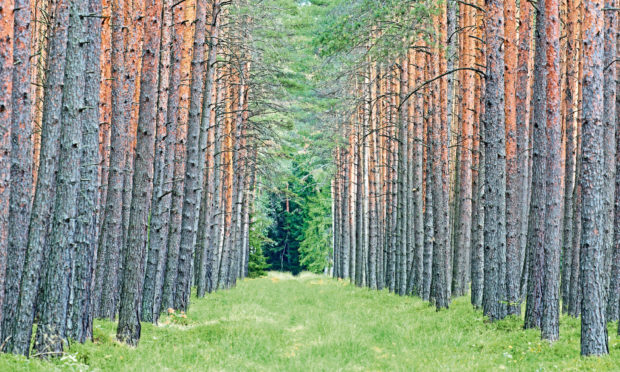This is a column about trees and deer – it doesn’t end well for Bambi.
“We predicted temperatures would rise, but we didn’t foresee these sorts of extreme events we’re getting so soon,” the former chief scientific advisor to the UK government, Professor Sir David King, said this week.
The world had changed faster than the UN’s Intergovernmental Panel on Climate Change (IPCC) predicted in 2014.
For this reason, he called for the UK government to bring forward its target of carbon reduction from 2050 by 10 years to 2040.
The Scottish Government’s target is 2045 – both governments are out of step with the evidence, according to King.
One way to tackle climate change is to plant trees – they absorb carbon and keep climate temperatures down.
Put simply, the canopy of leaves traps moisture close to the land.
“(Forest) restoration isn’t just one of our climate change solutions, it is overwhelmingly the top one,” Prof Tom Crowther at the Swiss university ETH Zürich, told the Guardian earlier this year, on publication of what the UN called “authoritative” research, which called for billions of trees to be planted.
The Scottish Government aims for 10,000 hectares of new woodlands per year. Last year more than 11,000 hectares of forest were planted.
Fergus Ewing, the Rural Economy Secretary, boasted it was around 60,000 trees a day, 22 million in the year. The message is that Scotland is doing its global bit.
The Scottish Government is so pleased about its ambitions on tackling the climate emergency, it is sending the MEP Dr Aileen McLeod to New York next week to tell the UN climate summit just how green we are.
Putting a person in business class for 6,000 miles there and back doesn’t cry eco-consciousness, but the UN doesn’t seem to have connected its own carbon footprint to the wider problem.
Somehow the world still needs white people in planes to get things done.
Dr McLeod might use the time to read a report, co-sponsored by the UK Government’s Department for International Development, published this week and intended to influence the agenda in New York.
“Growing Better: Ten Critical Transitions to Transform Food and Land Use” contains a startling fact.
Across the world, £560 billion is given to landowners to plant stuff, of which only 1% is intended to tackle climate change. Obviously, food is needed, and in lots of places it’s either very hard to grow or, like here, its not very profitable. Public money makes global land management and food production as we know it possible.
What the report prompts is a simple question – what if current global land management is plain stupid?
£250 million of tax money has been available to landowners in Scotland since 2014 to plant trees under the Forestry Grant Scheme (FGS).
It’s reasonable we celebrate a government target being met when it’s to do with climate – but let’s be clear, the task is not that difficult.
We have lots of land and the public subsidy makes it a risk-free investment.
We do not even ask the landowners to return any profit from selling the timber latter on – or demand that the forest they plant be public amenities. For that matter, we do not question the other tax incentives which make putting a tree into the ground in Scotland the kind of investment that rich people across the world are sold, alongside other tax “efficient” schemes.
Trees grow of their own accord.
Scotland used to be covered in them until mankind chopped them down.
If you leave a bit of wild ground anywhere in Scotland for a few years saplings will spring up – nature is quite good at planting its own trees.
The FGS is different only in scale to going to local allotments and handing out cash for people to grow weeds.
There is a reason why landowners demand public money to do what nature intended anyway – it’s because they are also fond of deer.
Deer eat small growth on the hillsides. Which is why vast stretches of land are empty of trees. And why our “forests” are dotted with the ridiculous artificial enclosures of uniform spruce – fast-growing for profit, fenced off to keep the deer out.
The land management culture in Scotland makes no sense. We give handouts to the landowners, who continue to self-harm the environment.
If this was drug addicts we were talking about there would be outrage.
Instead, the government celebrates this wasteful set-up because it’s “how things are done”.
For a fraction of the £250 million that Scotland has spent on planting trees, it could have shot a lot of deer and restricted the remaining ones to more obvious “farms” or designated territories.
I’m not saying this would magically see a forest spring up, or that deer are the only tree eaters, or that landowners are bad. I am saying that the Scottish Government’s climate policy is embarrassingly confused.
Instead of flying to New York, a short trip to the empty hillsides and an honest assessment of the problem might do a lot more for our planet.










